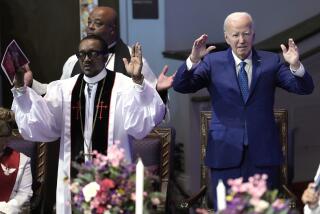PERSPECTIVE ON AIDS : In the Black Church, There Is No ‘Silence’ : Even though we must, and do, help the sinners, we cannot be pressured into condoning their sins.
The Washington Post, the Los Angeles Times and the Baltimore Sun are just a few of the nationally known newspapers that have recently run articles on the black church’s “silence” about AIDS. These articles portray a church that is, at best, misguided and, at worst, insensitive in dealing with the devastating effect that HIV and AIDS are having on the African-American community. I believe these negative perceptions grow out of a combination of misinformation and misunderstanding of what the black church stands for and is doing.
The truth is that black churches, their pastors and members have been engaged in dealing with the effects of AIDS in the African-American community for a long time. The regular visits to AIDS patients and their families fall under the umbrella of our sick and shut-in ministries. Counseling and financial assistance for families whose loved ones have contracted the disease come under the umbrella of already established ministries of the church.
There are few, if any, black congregations that have not been touched by AIDS. More often than not, the process--from diagnosis to illness to death--has forced the church to face its own fears and misconceptions about the illness and its consequences. As I visited African-American churches across the country, I began to wonder if the real problem is the church’s “silence” about AIDS or the fact that some interest groups are trying to use the issue to force us to accept a definition of sexual morality, sexual preference and safe sex that the church has serious theological and Biblical reservations about.
Clearly, the black church is not monolithic in its view of sexuality. There are some churches that are extremely liberal and others that are very conservative. It is, however, a serious mistake for some African-American intellectuals, gay-rights activists and liberal politicians to brand the black church as Victorian and homophobic because it lifts up a different standard on the issue of sexuality.
The black church does not have a history of gay-bashing and homophobia. Even those churches that hold to the conservative approach on sexual issues have loved the homosexual while disliking the practice of homosexuality. While our pews hold people who have committed adultery and fornication, and may have had children outside of marriage, the black church at its best has managed to love the sinner without loving the sin. To deny a church its right to define the issues of sexual morality, preference and safe sex for its members in a way that is consistent with that congregation’s understanding of Scripture is a form of spiritual fascism and church-bashing that must not be tolerated.
AIDS is indeed a life-or-death issue for the African-American community and the black church, as it is for the entire world. Yet even in this crisis, racism raises its head. How much of the monies raised to sustain AIDS patients and support groups are earmarked for, and ultimately reach, the African-American community? Why is the African continent, which has the world’s highest number of AIDS cases, many of them children, ignored when it comes time to develop an international strategy to deal with the disease? AIDS activists outside the African-American community, and those who are African-American but insensitive to the needs of our community, must be reminded that the black church is struggling with other issues that cause our community to journey through the existential valley of the shadow of death. These are issues that many of them ignore or refuse to embrace.
In an attempt to empower the black church in developing a liberating strategy that helps us overcome the AIDS crisis, I raise the following issue for consideration and dialogue:
What would Jesus do? In our attempt to develop meaningful ministries and theological rationales, it is important that we closely read the Gospels and honestly deal with what Jesus would do if He were confronted by an HIV carrier or AIDS patients. Would Jesus refuse to touch them, talk to them, minister to them? Would Jesus ignore their families’ pain and avoid the patients and their families? Would Jesus exclude or include them in His ministry of deliverance to the captives?
The answer is lucidly presented in the New Testament account of Jesus’ life. In short, He would embrace them and share the power of the liberating love He has for all of humanity. Can the black church afford to do any less?


